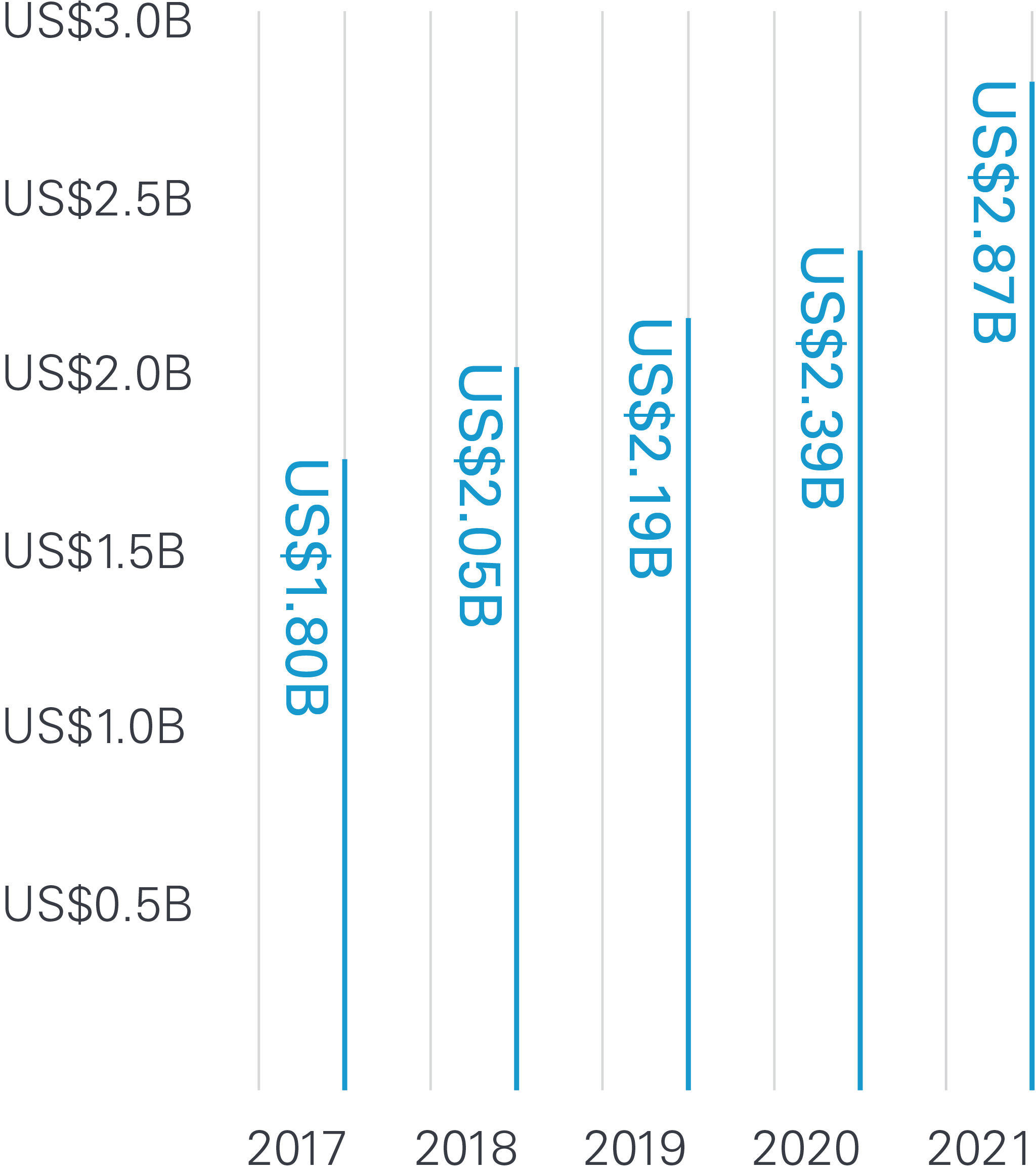What have we learned from COVID-19?
Epidemiologist Syra Madad says it’s critical to engage with local communities



Hugh Verrier
Chair
In 2021, the COVID-19 pandemic continued to affect nearly every aspect of our lives. Against this backdrop, our global teams worked on groundbreaking transactions, resolved high-stakes disputes and, through our global citizenship initiatives, responded to societal challenges around the world.
The role of business in society evolved as environmental, social and governance (ESG) issues entered the mainstream, concentrating on challenges including the energy transition and achieving greater diversity and inclusion. Like our clients, we looked for ways to create long term value and growth—a shared goal that created opportunities for collaboration.
It was in this context that we launched a new five-year strategy, focused on creating a distinctive experience for our clients.
Our emphasis on complex, cross-border matters helped us grow in all of the regions where we work and achieve outstanding results for our clients. As we look to the next five years, we are committed to building the capabilities our clients need, supported by a strong, resilient culture.
Guest speakers at Firm events talk about issues that made news in 2021
Epidemiologist Syra Madad says it’s critical to engage with local communities

Think tank CEO Chris Pinney is encouraged by moves to focus on impact, not just policies and procedures

Bill Emmott, who co-leads a nonprofit that studies the far-reaching effects of COVID-19, discusses the importance of business scenario planning

Developments that reshaped the world
Countries and companies are increasingly committing to net-zero goals that would require them to significantly reduce carbon emissions on relatively short timelines

The pandemic accelerated global concerns over climate change and inequality, pushing societal expectations around responsible business practices into the spotlight

Most of 2021 was characterized by free-flowing capital, as government aid in response to COVID-19 propped up economies

Globalization may be evolving, as nations and regions reassert their regulatory powers on a wide range of issues

Matters in eight practice areas that highlight our global impact for clients
Our 2021 achievements cap an outstanding five-year success story

2,464 Total lawyers
An outstanding roster of talented lawyers strengthened our Firm in 2021

White & Case earned many of the legal industry’s top accolades for outstanding performance in 2021

White & Case is committed to fair and ethical operations that respect human rights and recognize the importance of our natural environment.
As a signatory to the UN Global Compact we affirm our commitment to doing business responsibly by supporting the Compact’s ten principles on human rights, labor, the environment and anti-corruption. The steps we are taking to continue to embed these principles into our Firm are outlined in our most recent Communication on Progress.
Our latest Environmental Sustainability Report includes information on our environmental policies, footprint, key actions and goals.
Where White & Case is a longtime leader — and we're just getting started.
10 global affinity networks
Our ten global affinity networks foster a sense of community among the Firm’s Black, Asian, Latinx/Hispanic, Middle Eastern, minority ethnic and LGBT+ lawyers, business services professionals and their allies. Each network sets its own agenda, initiatives and goals, which are specific to the issues it feels are most important. Affinity networks also create and enhance awareness of these groups within the Firm and its larger culture, drive community and connection across our global offices, and support their members with career and professional development opportunities.
26 local women’s networks
Our 26 local women’s networks are active in 40 offices across the Americas, EMEA and Asia-Pacific. These networks foster professional development and mentoring activities, and support business-related client partnerships. They also provide a forum for our lawyers and business services professionals to share perspectives and create programs to support and retain our talent while fostering and promoting gender equity.
For more than a decade, leading publications and alliance organizations have recognized White & Case’s commitment to diversity and inclusion.
We continued to advance toward our diversity and inclusion goals, narrowing the gap between thought and action with new trainings

Like our clients, we are seeking ways to sustainably create long-term value and growth, a shared goal that presents opportunities to collaborate

We set out to ensure we provide our clients with an experience that emphasizes the attributes they seek in a trusted advisor


Epidemiologist Syra Madad says it's critical to engage with local communities
Syra Madad, an epidemiologist and pathogens preparedness expert, spoke to White & Case about pandemic preparedness and vaccine science during a February 2021 virtual event for our offices in the Americas. She serves as senior director, system-wide special pathogens program at NYC Health and Hospitals and is a fellow at the Belfer Center for Science and International Affairs. She is also an adjunct faculty member at Boston University’s Center for Emerging Infectious Diseases Policy & Research.
We talked to Madad about combatting misinformation, how businesses can help fight pandemics and how the secondary effects of COVID-19 will shape the world for years to come. An edited and condensed version of that conversation follows.
How can we fight the misinformation and disinformation about COVID-19 and vaccines that have proliferated since you spoke to us in early 2021?
First, it’s important to note that while these issues are more front and center in the United States, it’s a problem around the world and is causing this pandemic to go on for longer than it needs to. So while we have to combat it globally, in the US we’re seeing the results of our failure to engage with local communities early on. Community engagement is critical to fighting misinformation and disinformation about COVID-19 and vaccines.
What exactly is ”community engagement?“
Through community engagement, trusted messengers educate the public to promote measures that prevent and control viral spread. For example, local faith-based organizations or community centers can be leveraged and given the tools to educate the people they serve. Community engagement provides clear science-based communications that address cultural barriers, like language, and help people understand why it’s important to, for example, wear a mask. It meets people where they are. In the US, we’ve used community education to increase vaccination rates, but we didn’t use it early in the pandemic, which is one reason why there was so much bad information.
How can businesses play a role in responding to COVID-19—and future pandemics?
A lot needs to happen in the occupational work space to create healthier, safer environments—independent of COVID-19. But COVID-19 emphasized the importance of good ventilation and air quality. It’s also important for companies to infuse education into the workplace. Today we’re dealing with COVID-19, but we deal with so many other things every year, like seasonal flu and severe storms. So companies need an all-hazards approach that protects their workforce. It’s important to recognize that businesses function best when their employees are healthy and safe. That means providing resources like paid sick leave or the ability to work from home when necessary.
In addition to changing the way many people work, what are some enduring effects of COVID-19?
It has impacted everything from the way we interact with each other to how we look at other infectious diseases. For example, it’s had a significant impact on tuberculosis. Data shows that, with so many resources going toward COVID-19 and less attention paid to other diseases, 1.2 million fewer people were diagnosed with and treated for TB in 2021 compared to 2019. That’s a huge issue because TB kills about 4,000 people a day around the world. Looking generally at vaccine-preventable infectious diseases, COVID-19 put our progress back at least a decade and we’re seeing a record low number of routine vaccination rates worldwide. It’s also had a huge impact on mental health. And then there’s long COVID itself. Data shows that at least one in three people infected with COVID-19 suffer long-term consequences. We don’t yet know how long those symptoms will last. There’s a lot we still don’t know, but we’re learning more every day.
Are we better prepared for the next pandemic?
We’ve made progress. In the US, the Biden administration set a goal of developing a vaccine in response to the next threat within 100 days and then being able to deliver that vaccine in another 100 days. The administration also invested US$65 billion, which really is a down payment, in looking at how to prevent future pandemics. Things like this can help us better prepare. But at the end of the day, two things can continue to undermine everything we do in terms of future emergencies. One is people’s behavior—what they do to protect themselves and their neighbors. You can’t accomplish anything without investing more in people, which gets back to the need for community engagement. The second is political leadership. In the US, any federal administration isn’t around for more than eight years. If the next administration doesn’t care about science or pandemic preparedness, any gains we’ve made will go down the drain. So when we elect our leaders—tomorrow, 20 or 100 years from now, we need to choose people who will sustain our progress.
Photo by Andreea Alexandru © Associated Press
Lights inside COVID-19 vaccine containers shine beside empty containers stacked to resemble a Christmas tree